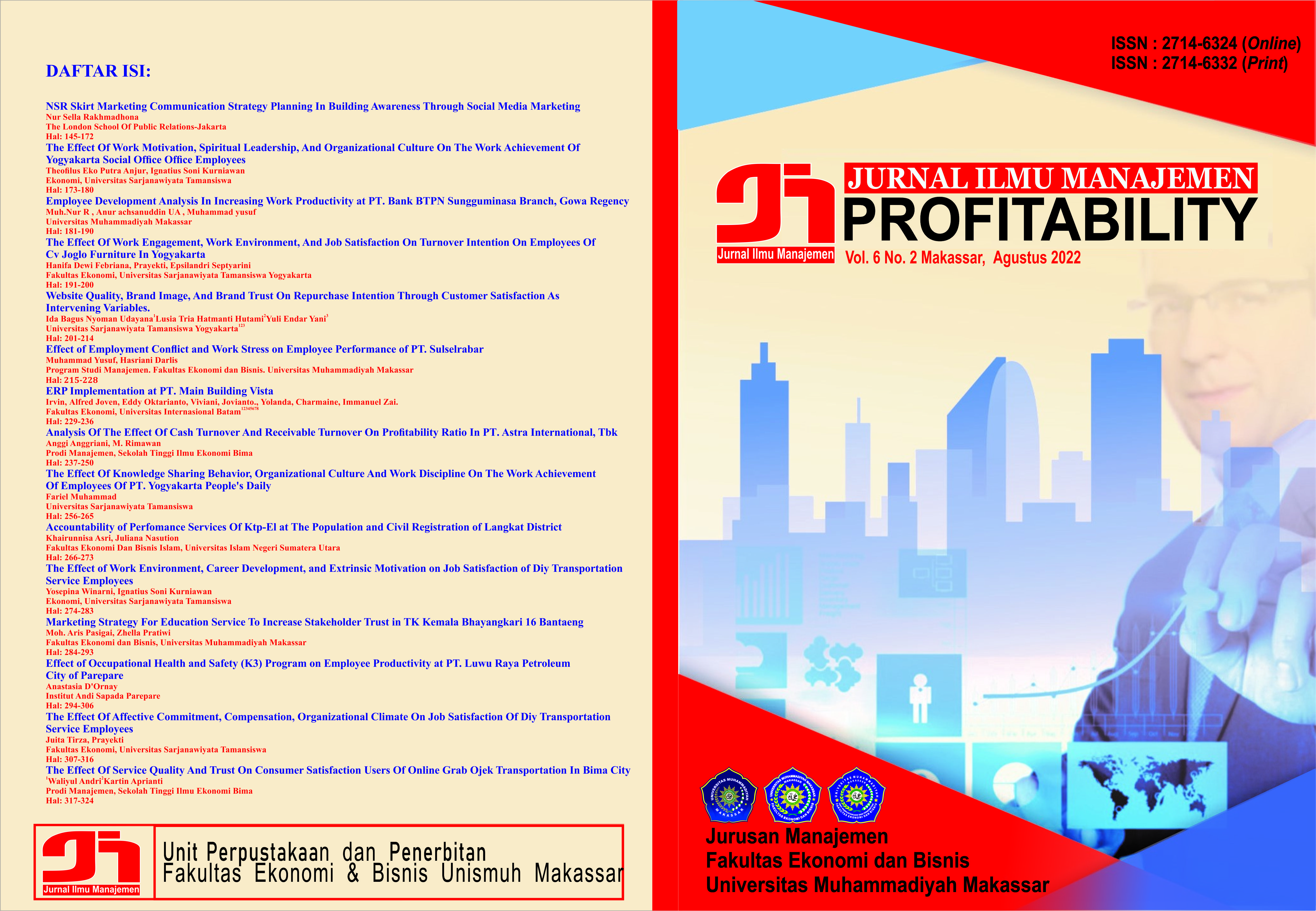Implementation of Transparency and Accountability in Financial Management of Village Fund Allocation in 2022 in Pandai Village, Woha District, Bima District
DOI: https://doi.org/10.26618/profitability.v8i1.14080
Allocation of Village Funds, Transparency, Accountability
Abstract
This research is a type of qualitative research which aims to explore the implementation of transparency and accountability in the financial management of Village Fund allocations (ADD) in Pandai Village, Woha District, Bima Regency, in 2022. In the context of regional autonomy, the village government has the responsibility to independently manage the resources and funds provided to improve development and welfare of the community. This research uses primary and secondary data, with data collection techniques in the form of observation, interviews and documentation. The research results show that Pandai Village has implemented the principles of accountability and transparency in all stages of ADD management, from planning to reporting. The application of the accountability principle involves responsibility and reporting, which has been implemented through an online system and monthly accountability reports submitted to the relevant agencies. This process involves all relevant agencies, the Village Consultative Body (BPD), and the village community. In the aspect of transparency, Pandai Village actively involves the community in planning through village meetings, where community participation is highly valued. In addition, the implementation of physical and non-physical activities funded by ADD is made open through information boards, billboards and quarterly accountability placed in front of the village office. The Pandai Village community is actively involved in every stage, from village deliberations to evaluating the implementation of activities. Thus, Pandai Village has succeeded in implementing transparency and accountability in ADD management, creating community involvement, and providing clear information regarding the use of village funds. The application of these principles is an important basis for realizing good governance at the village level..
References
Andini, Hanni 2018. Penerapan Prinsip Akuntabilitas dan Prinsip Transparansi dalam Pengelolaan Keuangan Desa (Studi Kasus di Desa Sinduharjo, Kecamatan Ngaglik, Kabupaten Sleman)
Badan Pengawasan Keuangan dan Pembangunan. Petunjuk Pelaksanaan Bimbingan dan Konsultasi Pengelolaan Keuangan Desa. Jakarta: Badan Pengawasan penyelenggaraan Keuangan Daerah 2018.
Farida, V., Jati, A. W., & Harventy, R. (2018). Analisis Akuntabilitas Pengelolaan Alokasi Dana Desa (Add) Di Kecamatan Candipuro Kabupaten Lumajang. Jurnal Akademi Akuntansi, 1(1), 64–73.
Garung, Christina Yunnita, and Linda Lomi Ga. 2020. “Pengaruh Akuntabilitas Dan Transparansi Terhadap Pengelolaan Alokasi Dana Desa (Add) Dalam Pencapaian Good Governance Pada Desa Manulea, Kecamatan Sasitamean, Kabupaten Malaka.” Jurnal Akuntansi : Transparansi Dan Akuntabilitas 8(1):19–27.
Kementerian Desa, Pembangunan Daerah Tertinggal, Dan Transmigrasi Republik Indonesia Nomor 11 Tahun 2019 Tentang Prioritas Penggunaan Dana Desa Tahun 2020.
Kisnawati, B., Astini,Y., & Oktaviani,R. N. 2018. Transparansi dan akuntabilitas pengelolaan keuangan Alokasi Dana Desa (ADD) di Kecamatan Moyo Hilir Kabupaten Sumbawa Besar. VALID Jurnal Ilmiah, 15(1), 1-10.
Lestari, S. 2017. Analisis Akuntabilitas Pengelolaan Alokasi Dana Desa (ADD) (Studi Kasus di Wilayah Kecamatan Banyudono). 35–40. Retrieved from https://services.srchweb.org/crx/search.php.
Peraturan Bupati No.12 Tahun 2015, Tentang Pedoman Umum Pelaksanaan ADD.
Peraturan Menteri dalam Negeri Republik Indonesia Nomor 113 tahun 2014 pasal 20
Peraturan Menteri Dalam Negeri Republik Indonesia No. 113 Tahun 2014 tentang Pengelolaan Keuangan Desa.Www.keuangandesa.com/wp- content/uploads/2015/04.
Permendagri Nomor 20. 2018, Tentang Pengelolaan Keuangan Desa
Peraturan Undang-Undang No. 6 Tahun 2014 tentang Desa.
Prasetyowati, Irma, Hari Purnomo, and Emmy Ermawati. “Analisis Pengelolaan Keuangan Alokasi Dana Desa Di Desa Kenongo Kecamatan Gucialit Kabupaten Lumajang.” Counting: Journal of Accounting 3, no. 1 (2020): 55–61
Rahajeng, Maharani Mufti. 2020. “Penerapan Prinsip–Prinsip Good Governance Dalam Pengelolaan Dana Desa Di Desa Wlahar Wetan Kecamatan Kalibagor Kabupaten Banyumas.” Public Policy and Managament Inquiry. 4(2):163–74
Rahmatullah, A. F., & Rahmatullah, A. F. 2021. Good Governance Dalam Pengelolaan Dana Desa Teluk Majelis Kabupaten Tanjung Jabung Timur Provinsi Jambi. Jurnal Ilmu Pemerintahan Widya Praja, 24- 33.
Rayyani, W. O., & Abbas, A. (2020). Akuntabilitas Kinerja dalam Bingkai Tauhid Sosial: Suatu Refleksi Teologi Al Ma’Un. Kamaya: Jurnal Ilmu Agama, 3(2), 174–190.
Sugiyono. 2016/2017. Metode Penelitian (Kuantitatif, Kualitatif, dan R&D).Bandung: Alfabeta.
Sunardi, Yanti, Y., dan Ariansyah, W. 2019. Pengaruh Prinsip-Prinsip Good Governance Terhadap Kinerja Pemerintah Daerah Pada Badan Pengelola Pajak Dan Retribusi Daerah Kabupaten Musi Rawas
Sukandarumi2002. Pengertian informasi menurut para ahli. Sumber http://eprints.uny.ac.id
Syaputra, S., & Iskandar, E. 2018. Akuntabilitas Pengelolaan Alokasi Dana Desa (Add) Di Desa Muara Bengkal Kecamatan Muara Bengkal Kabupaten Kutai Timur. 6(2), 683–696.ejournal.ip.fisip-unmul.ac.id.
Tambuwun, F. V., Sabijono, H., & Alexander, S. W. 2018. Analisis Transparansi Dan Akuntabilitas Otonomi Desa Dalam Pengelolaan Dan Pertanggungjawaban Alokasi Dana Desa Di Desa Kauneran Satu Kecamatan Sonder Kabupaten Minahasa. Going Concern: Jurnal Riset Akuntansi, 13(04).
Undang-undang No 6 Tahun 2014 tentang Desa
Downloads
Published
Issue
Section
License
Authors who publish with Jurnal Ilmu Manajemen Profitability agree to the following terms:
Copyright of the articles remains with the authors.
Authors grant the journal the right of first publication with the work simultaneously licensed under a Creative Commons Attribution-NonCommercial 4.0 International License (CC BY-NC 4.0). This license allows others to:
Share (copy and redistribute the material in any medium or format)
Adapt (remix, transform, and build upon the material)
as long as they give appropriate credit to the original author(s) and source, provide a link to the license, and indicate if changes were made. Non-commercial use only.
Authors are permitted to:
Distribute their published work (e.g., post it to an institutional repository or publish it in a book), with an acknowledgment of its initial publication in this journal.
Enter into separate, additional contractual arrangements for the non-exclusive distribution of the journal’s published version of the work (e.g., post it to a class website or institutional archive).
For permissions to use the content published in this journal beyond the scope of the license (e.g., commercial purposes), please contact the editorial office via the journal email.
License Details:
This journal is licensed under a Creative Commons Attribution-NonCommercial 4.0 International License (CC BY-NC 4.0).












